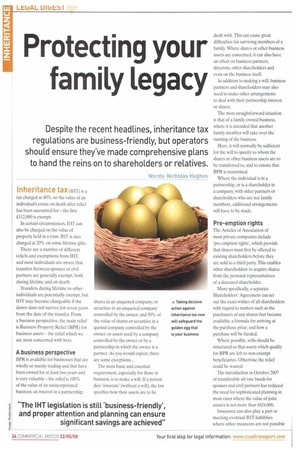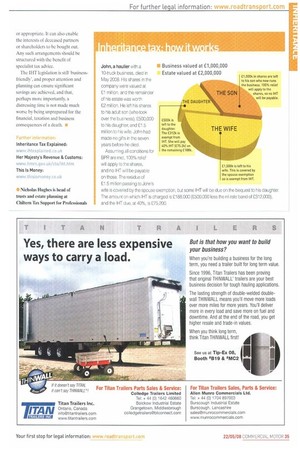Protecting your family legacy
Page 34

Page 35

If you've noticed an error in this article please click here to report it so we can fix it.
Despite the recent headlines, inheritance tax regulations are business-friendly, but operators should ensure they've made comprehensive plans to hand the reins on to shareholders or relatives.
Words: Nicholas Hughes Inheritance tax (IHT) is a tax charged at 40% on the value of an individual's estate on death after relief has been accounted for — the first £312,000 is exempt.
In certain circumstances, IHT can also be charged on the value of property held in a trust. MT is also charged at 20% on some lifetime gifts.
There are a number of different reliefs and exemptions from IHT, and most individuals are aware that transfers between spouses or civil partners are generally exempt, both during lifetime and on death.
Transfers during lifetime to other individuals are potentially exempt, but IHT may become chargeable if the donor does not survive for seven years from the date of the transfer. From a business perspective, the main relief is Business Property Relief (BPR) for business assets — the relief which we are most concerned with here.
A business perspective
BPR is available for businesses that are wholly or mainly trading and that have been owned for at least two years and is very valuable — the relief is 100% of the value of an unincorporated business; an interest in a partnership: shares in an unquoted company; or securities in an unquoted company controlled by the owner; and 50% of the value of shares or securities in a quoted company controlled by the owner; or assets used by a company controlled by the owner or by a partnership in which the owner is a partner. As you would expect, there are some exceptions...
The most basic and essential requirement. especially for those in business, is to make a will. If a person dies 'intestate' (without a will), the law specifies how their assets are to be dealt with. This can cause great difficulties for surviving members of a family. Where shares or other business assets are concerned, it can also have an effect on business partners, directors, other shareholders and even on the business itself.
In addition to making a will, business partners and shareholders may also need to make other arrangements to deal with their partnership interest or shares.
The most straightforward situation is that of a family owned business, where it is intended that another family member will take over the running of the business.
Here, it will normally be sufficient for the will to specify to whom the shares or other business assets are to be transferred to, and to ensure that BPR is maximised.
Where the individual is in a partnership, or is a shareholder in a company, with other partners or shareholders who are not family members, additional arrangements will have to be made.
Pre-emption rights
The Articles of Association of most private companies include 'pre-emption rights', which provide that shares must first be offered to existing shareholders before they are sold to a third party. This enables other shareholders to acquire shares from the personal representatives of a deceased shareholder.
More specifically. a separate Shareholders' Agreement can set out the exact wishes of all shareholders with regard to matters such as the purchasers of any shares that become available; a formula for arriving at the purchase price; and how a purchase will be funded.
Where possible, wills should be structured so that assets which qualify for BPR are left to non-exempt beneficiaries. Otherwise the relief could be wasted.
The introduction in October 2007 of transferable nil rate bands for spouses and civil partners has reduced the need for sophisticated planning in most cases where the value of joint estates is not more than £624,000.
Insurance can also play a part in meeting eventual IHT liabilities where other measures are not possible
or appropriate. It can also enable the interests of deceased partners or shareholders to bc bought out. Any such arrangements should be structured with the benefit of specialist tax advice. The NT legislation is still' businessfriendly', and proper attention and planning can ensure significant savings are achieved, and that, perhaps more importantly, a distressing time is not made much worse by being unprepared for the financial, taxation and business consequences of a death. El
Inheritance Tax Explained: www,ihtexplw ned.co.uk Her Majesty's Revenue & Customs: mic.rgov.uk/cto/mt.htrn This Is Money: www.thisismoney.co.uk












































































































































































